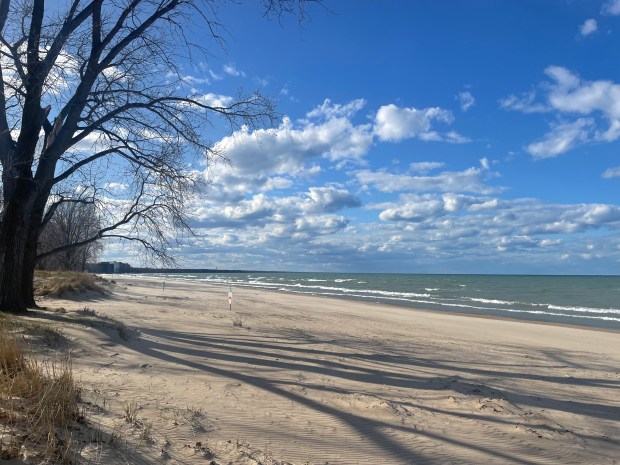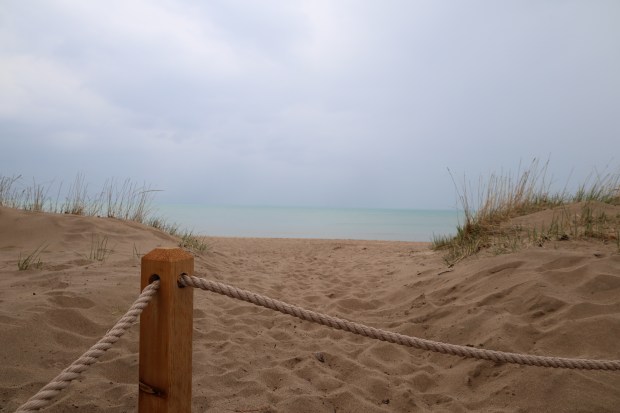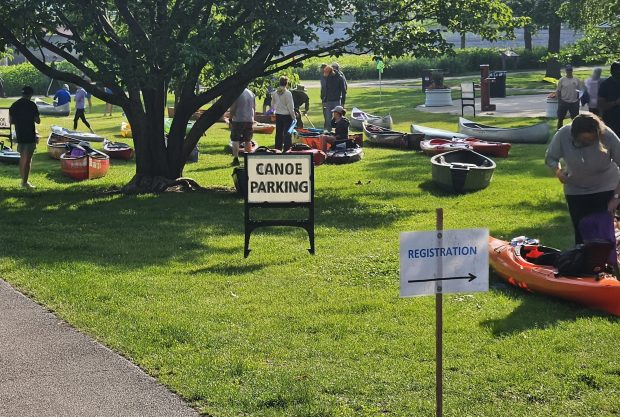As families start thinking about going to the beach this summer, Wilmette Park District officials said their 2025 Lakefront Operations Plan will both address recent resident concerns and preserve the village’s natural landscapes at its beaches.
Among the changes is the introduction of The Cove, a non-swimming zone where kayakers and users of other non-motorized watercraft can access Lake Michigan. It will share the southern end of the Gillson Beach lakefront with The Dog Beach, which will allow off-leash dogs, spokesman JP McNamara said.
Other changes, according to McNamara, include aligning beach hours with other beaches on the North Shore and replacing fences with ropes, held between posts erected in the ground, at beach entrances.
The changes in the plan, released March 21, reflect an “ongoing commitment to balancing community needs with responsible beach and dune management,” McNamara said.
“Our goal is to create an inclusive, accessible, and well-maintained lakefront that welcomes all visitors while preserving our natural landscapes,” Recreation Superintendent Dave Merrill said in a statement. “This year’s operational updates stem from thorough community engagement, data collection, and valuable input from lakefront staff and the Board of Park Commissioners.”
Residents complained last year when the Park District restricted dog access, erected a fence across the South Beach area of South Park and began charging admission fees for swimming there.
The fees will remain for swimming and launching watercraft, but the south end of the beach will be free to those who simply want to sit on the beach or relax in the sand, McNamara said. Swimming will be allowed farther north on South Beach, but not at The Cove or The Dog Beach.
“You can bring a vessel and launch at the beach with the use of a pass,” he said. “But it will be monitored by staff to make sure everything is going OK over there, where patrons can put their toes in the sand, relax and enjoy unobstructed views. There will be no swimming other than those with vessels.”
Those water vessels include stand-up paddle boards, kayaks and canoes, but users of larger watercraft will be directed to the sailing beach, McNamara said.
In response to community feedback collected during 2024, the Park District conducted focus groups to better understand resident concerns and expectations, he said. The data helped shape the operational plan, which balances safety, visitor access and environmental responsibility, McNamara said.
“We heard our community’s feedback loud and clear,” said Megan White, lakefront general manager. “By making thoughtful adjustments to our access policies, pricing structure, and conservation efforts, we are ensuring that Wilmette’s lakefront remains a treasured space for years to come.”
McNamara said resident complaints centered around obstructed views caused by the fences erected last year.
The board chose to address those concerns by using posts and ropes to cordon off front access to the beach without blocking views and a fence on the lake side to help protect “fragile dune habitats,” he said.
“The post-and-rope system notifies people of where the dunes lie and where we’re trying to redirect people to preserve the dunes,” McNamara said. “It keeps people on the sidewalks on the front end. On the back end, the fence is the same idea, so that people don’t trample on the dune and they exit a little easier with the fence guiding them.”
All Wilmette beaches will be open from 10 a.m. to 8 p.m. daily, which will align with hours offered at other North Shore beaches, he said.

The beaches will also improve ADA access by widening entry points and erecting benches in those locations, McNamara said.
Pricing for seasonal beach passes will remain the same, he said: $11 for residents and $17 for non-residents at Gillson and Langdon beaches; $5 for residents and $10 for non-residents at South Beach.





